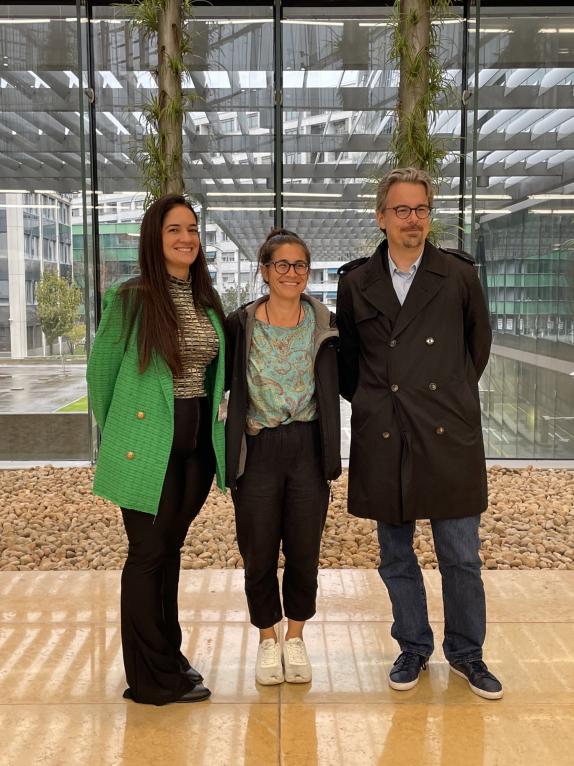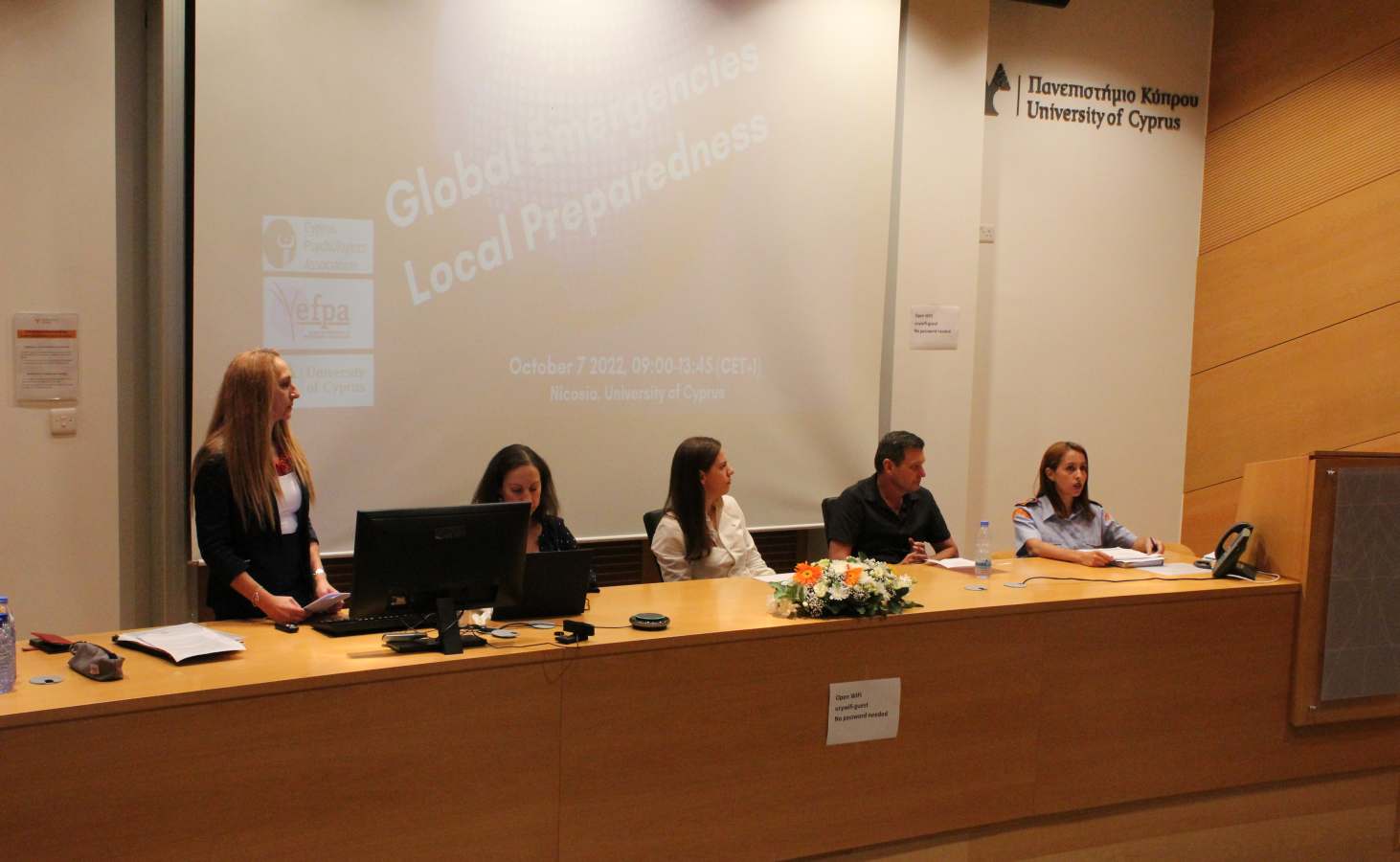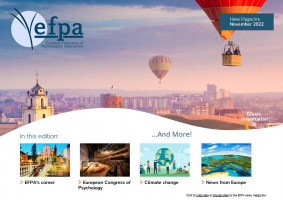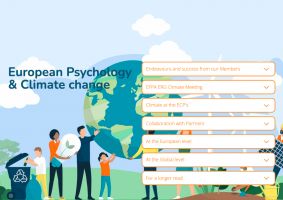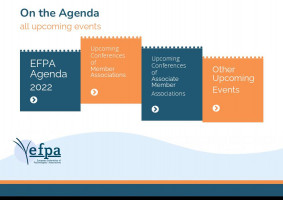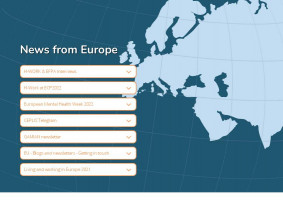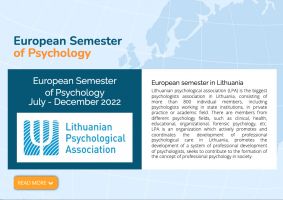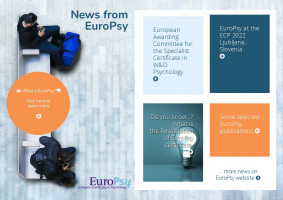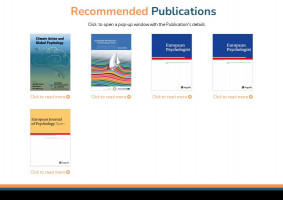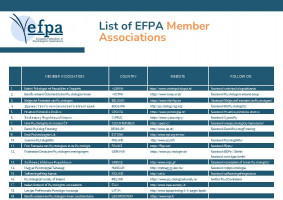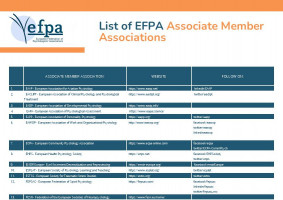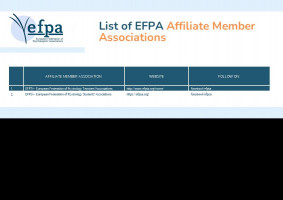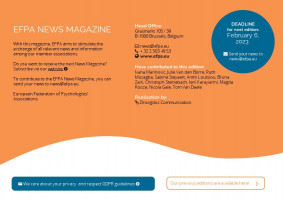
READ MORE
_w388_h484_1.jpg)
Dear colleagues,
“Awareness of the importance of mental health is strong and on the rise in society at large and in the European institutions. And so is the need for psychological support.” That was one of our key messages on World Mental Health Day. Psychology is important and it is in demand as never before. But it is not an end in itself. After all, it is about the people who need help and support in their special situation. It is also about their relatives and friends, or colleagues at work. And in addition to high-quality offers of counseling and therapy, we are also concerned with prevention and assistance. And this is across the lifespan and from the individual to the family, friends, work team, neighborhood and community.
This newsletter now echoes many of these aspects, themes and offerings. But this issue of the Newsmagazine also highlights how interconnected the issue of mental health is with other important challenges and problems. Thus we inform about the effects of climate change, the initiatives and offers of our member associations, the COP27 as well as about our expert group on climate change or with the aim of a closer cooperation with the United Nations in Geneva.
In all initiatives, the close cooperation between the Executive Board, the Head Office, the volunteers in the groups and the member associations is evident. This was also noticeable at the last congress in Ljubljana. The many stimulating personal and professional encounters will certainly remain in our memories, as will the beautiful city and the impressive hospitality of our friends. Expertise, commitment and friendship was again palpable at the meeting of the Executive Council with the organizers of the upcoming European Congress in Brighton. ECP2023 in Brighton shows again how versatile and high quality psychology is in research and practice.
But we are also happy to report in this newsletter about the re-launch of the European semesters. We start with Lithuania and look forward to the upcoming Executive Council meeting and Presidents' Council meeting in Vilnius. Because the diversity and expertise of psychology is not only shown in topics and offers, but also in different very high quality profiles of the psychology of the countries.
Despite all diversity, independence and difference, we are united by the concern to promote a life of people in freedom and self-determination. Mental health and well-being thus becomes the goal but also the compass for our efforts. And because it applies to all people, it also applies to us. I.e. we also have to take care of ourselves and, with all our efforts for others, make sure that we ourselves have (mental) energy left! In this sense, I wish you not only much pleasure in reading the newsletter, but also times of rest again and again!
With all good wishes, yours,
Christoph Steinebach
EFPA President
Psychology is coming to the United Nations in Geneva
The collaboration between the Federation of Swiss Psychologists (FSP), the European Federation of Psychologists’ Associations (EFPA), and the American Psychological Association (APA) to develop a presence for the science and profession of Psychology at the United Nations (UN) in Geneva was launched in Geneva on Friday 21 October 2022.
The representatives who were recruited following an open call met with the organisational representatives of the collaborating organisations (Julien Perriard and Tarek Ben Jemia of FSP, Nicola Gale of EFPA, and Gabe Twose of APA), to hear speakers from the UN (including WHO) and others to set the context for the work, and begin a strategic planning process for the year ahead. Also on the steering group are Amanda Clinton of APA and Christoph Steinebach of EFPA.
These locally based representatives will be the face of our psychology Associations at the UN in Geneva, building relationships, attending, speaking at and sometimes organising events, and responding to UN consultation documents and needs. They introduce themselves and why they are doing this role below:
-
Read the introduction of the representatives - Fold out text
Tobias Brosch is associate professor at the University of Geneva where he holds the chair for Psychology of Sustainable Development. He is associate editor for the journal Cognition and Emotion and member of the editorial advisory board of the Journal of Environmental Psychology. In his research, he focuses on understanding the social, affective, and cognitive drivers of sustainable choices and behaviours. Tobias will advocate for a stronger integration of psychological insights into UN policies and programmes that aim to promote sustainable behaviour change.
Karina Pina is a licensed Clinical Psychologist and holds a master’s in International Humanitarian Action with a specialization in Disaster and Response Analysis. Her international work experience includes the International Committee of the Red Cross (ICRC), the United Nations Office at Geneva (UNOG), the United Nations Office for the Coordination of Humanitarian Affairs (UNOCHA), and other organizations. Karina will advocate for better understanding of the importance of psychological science and its link and importance related to the current global challenges.
Yeniffer Rosas is a licensed psychologist in Switzerland with 18 years of experience both nationally and internationally contributing to the development of psychopedagogical projects aimed at promoting children’s rights. Yeniffer is glad to advocate for children's mental health rights at the United Nations with the objective of encouraging the development of psychologically informed policies and programmes to help achieve the SDGs in the UN system.
Of particular relevance to the forthcoming work of the representatives, the launch event sessions included presentations from the NGO Liaison Unit, and Conference of NGOs in Consultative Relationship with the UN (CoNGO).
Sophie Torelli Chironi of the NGO liaison unit emphasised the general need for more inclusive international collaboration. She described how Civil Society has had a place at the UN from its outset and referred to ‘Our common agenda’, a recent report from the Secretary General which includes a commitment to increased integration of civil society. She explained the privileged situation of the UN in Geneva, describing it as the operational hub, ‘the kitchen that cooks the food to serve in New York’, rich in both academia and private sector, and a big network of health and other sectors including environmental protection.
Cyril Ritchie described how CoNGO, founded in 1948, has provided an interface between civil society and UN system. He said CoNGO speaks out to defend values and lobby for sufficient UN funding to cope with global challenges. The previous year’s CoNGO civil society summit considered human rights, sustainability, peace, social justice, gender, youth and intragenerational issues, civil society etc. Their focus is on implementation of the SDGs.
The aim of the collaboration is to complement the longstanding work of the APA at the UN in New York, and aims to broaden the reach of European Psychology into international organisations that exist to find solutions to the problems of society.
_w1462_h908_1.jpg)
EFPA and APA are accredited nongovernmental organizations at the UN, where they hold special consultative status with the Economic and Social Council (ECOSOC). APA is also affiliated with the Department of Global Communications (DGC). APA has been active at the UN in New York since 1999.
This collaboration focused on the UN in Geneva seeks to bring psychological science to bear on the work of the UN through fostering dialogue and information exchange among psychologists, UN staff, and member state representatives to encourage the development of psychologically-informed policies and programmes to help achieve the UN Sustainable Development Goals.
The work will initially focus on psychological contributions to combating climate change and promoting children’s mental health, which are priorities for both the UN and the collaborating organizations.
For more information contact a member of the steering group via headoffice@efpa.eu.
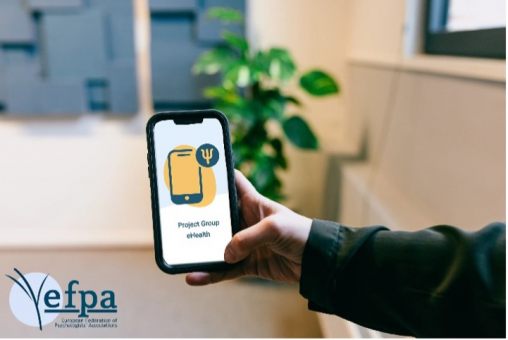
All psychologists in cyberspace?
By Tom Van Daele, Convenor of the EFPA Project Group eHealth
The project Group eHealth recently published an article on the use of online consultations by mental healthcare professionals. It aimed to document the uptake of online consultations in the early phases of the pandemic and explore if specific characteristics of psychologists across and beyond Europe could predict this.
-
Global survey
A total of 9115 healthcare professionals from 73 countries participated in the survey, of which about two-thirds used online consultations during the initial COVID-19 outbreak. Multiple determinants relating to the use and experience of online consultations were identified, including the professionals' age, experience with the technology before the outbreak, and the professional context.Importance of training
Strong evidence was also found for the importance and relevance of training of digital mental health. This strengthened earlier findings from a qualitative analysis of a subsample of the same survey, with data from 2082 professionals from Austria, Belgium, Cyprus, France, Germany, Italy, Lebanon, Lithuania, the Netherlands, Norway, Portugal, Spain, and Sweden. Both papers can offer arguments for the need to invest in additional training to support psychologists in creating optimal circumstances for selective and high-quality continued use of online consultations.
Recommendations for other technologies
As technology extends beyond online consultations, several recommendations can also be made regarding other forms of technology. Such guidelines can be found in an 2020 article highlighting recommendations on how to create the best possible context for e-mental health in which it supplements and enhances existing services. These recommendations are grouped according to 3 categories of key stakeholders: psychotherapists, health services and regulatory agencies, and developers.Importance of training
Strong evidence was also found for the importance and relevance of training of digital mental health. This strengthened earlier findings from a qualitative analysis of a subsample of the same survey, with data from 2082 professionals from Austria, Belgium, Cyprus, France, Germany, Italy, Lebanon, Lithuania, the Netherlands, Norway, Portugal, Spain, and Sweden. Both papers can offer arguments for the need to invest in additional training to support psychologists in creating optimal circumstances for selective and high-quality continued use of online consultations.
Recommendations for other technologies
As technology extends beyond online consultations, several recommendations can also be made regarding other forms of technology. Such guidelines can be found in an 2020 article highlighting recommendations on how to create the best possible context for e-mental health in which it supplements and enhances existing services. These recommendations are grouped according to 3 categories of key stakeholders: psychotherapists, health services and regulatory agencies, and developers.Free webinar on 22nd November
Want to learn more? As a prelude to a free 2023 EFPA webinar series on the potential of technology for psychology, an event will take place on 22 November 2022 at 3pm at Vilnius University, as a part of EFPA’s European Semester. You can either attend in person, or follow the livestream. More information can be found on the EFPA website. More deliverables from The project Group eHealth can be found there as well.
2nd International Nicosia Symposium on Crisis, Disaster and Trauma Psychology
7th October 2022, Nicosia, Cyprus
By Anthi Loutsiou, University of Cyprus, Cyprus Psychologists Association, Magda Rooze, EFPA Standing Committee Crisis, Disaster and Trauma Psychology, Eleni Karayianni, Cyprus Psychologists Association, University of Cyprus, EFPA Executive Council.
-
The second international symposium was organized again with great success by the Cyprus Psychological Association with the support of EFPA's Standing Committee on Crisis, Disaster and Trauma Psychology and in partnership with the University of Cyprus to commemorate the World Mental Health Day. The special theme of this year’s symposium was" Global emergencies, local preparedness" aiming to highlight that psychology as a science and an applied profession has a great deal to contribute to mental health in relation to crises, disasters, and emergencies.
Read more - text fold out
It was a great honor to have a keynote address from a representative of the World Health Organization (WHO- Europe). Ms. Melita Murko presented in the context of the pan-European Mental Health Coalition to promote the mental health agenda for 2021-2025, with special reference to the inclusion of mental health and psychosocial support in emergencies. There were three other sessions with invited speakers from Cyprus and six other European nations that covered a range of topics relating to psychosocial response preparedness and support to victims of various global emergencies such as the pandemic, natural disasters due to climate crisis, and forced migration due to war and political conflict.
The Standing Committee organized one of the sessions with four presentations from its members on lessons learned and best practices from various European countries. In another session, local experts from Cyprus shared a diverse insight on tools and systems of psychosocial support for vulnerable groups of people, such as children and the elderly.
In collaboration with EFPA’s Work Group on Climate Change, a special session on climate crisis was organized in alignment with one of EFPA’s fields of action for its 2021-2023 mandate. This session highlighted the psychosocial impact of natural disasters as a result of climate change and placed strategic emphasis on wild fires as a matter of national priority in Cyprus due to the country’s geographical location. This special topic of national importance was further analyzed in a roundtable discussion of experts at the end of the symposium.
The symposium was offered as free, hybrid event open to the public and was very well attended by almost 300 participants, in-person and on-line, from 22 countries. The technology milestones achieved during the pandemic crisis, were successfully leveraged by the organizers to open up the event to a larger audience locally and internationally. It brought together academics, community experts, students, policy makers, and other key stakeholders who share an interest in the field of Emergency and Trauma Psychology. It provided them with the opportunity to build national and cross-national collaborations to strengthen the capacity of European countries for psycho-social response preparedness in today’s global emergencies.
At a national level, the symposium contributed significantly to the development of the field and to the promotion of effective policy making in Cyprus. Local representatives from the Ministries of Education, Health and Interior and Civil Defense, and from key stakeholders from organizations such as Red Cross, Police, Fire and Rescue, and Phoenix Active Citizens attended the event and supported the strategic aims of the symposium. The Cyprus Ombudswoman for the Environment, who was also in attendance, made a public announcement at the end of the symposium with an initiative to create an inter-ministerial working group to facilitate the development of a more organized system of psychosocial support after wild fires in Cyprus that will be integrated in the state’s emergency response.
After the symposium, the Cyprus Psychological Association hosted the two-day, bi-annual meeting of the Standing Committee and offered warm hospitality with opportunities for networking, connection, and cultural exploration.
Follow us on
facebook

(1)_w1700_h406_1.png)
-
